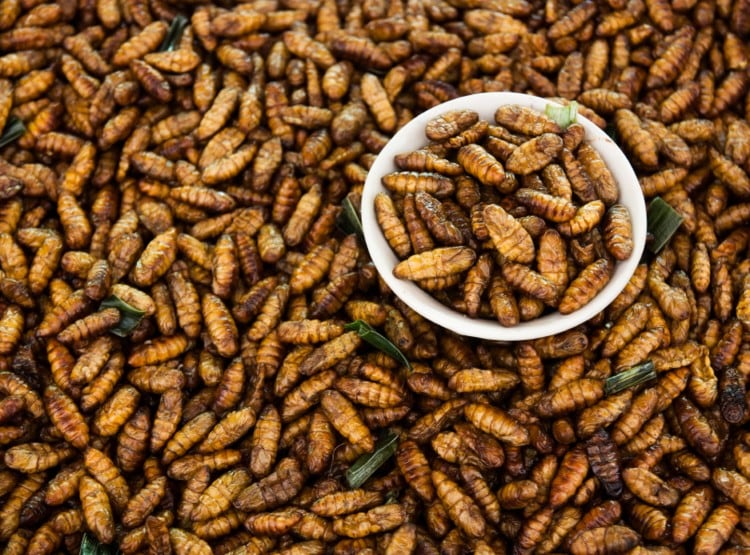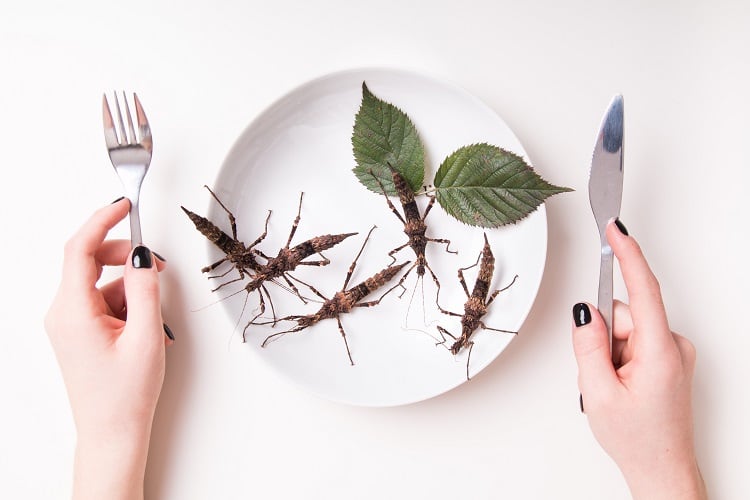The research, published in Frontiers in Nutrition, concluded that marketing strategies built around taste could prove the most effective way of promoting insect-based foods. Concentrate on promoting insects as ‘tasty’, ‘luxurious’, or an ‘exotic delicacy’ in order to change attitudes to foods that contain insect-derived protein, the researchers suggest.
The buzz on bugs
There are compelling reasons for Europeans to incorporate more insect-based protein into their diets. The United Nations’ Food and Agriculture Organization has been advocating on topics related to edible insects since 2003. The agency highlights that insect consumption can be associated with health and environmental benefits.
Edible insects contain high-quality protein, vitamins and amino acids. They are rich in fibre, represent a good source of healthy fats such as omega-3s and are high in nutrients such as calcium, iron, B vitamins, selenium and zinc.
Insects are also a more resource-efficient way of producing protein than traditional livestock rearing. The FAO estimates that crickets need six times less feed than cattle, four times less than sheep, and half as much as pigs and broiler chickens to produce the same amount of protein.
Food production accounts for 25% of all human greenhouse gas emissions. Livestock is a huge contributor and researchers and policymakers are trying to develop and promote more sustainable ways to produce animal protein. One option is farming and eating insects.
Insect-based products have a smaller carbon footprint than conventional livestock, emitting fewer greenhouse gasses and less ammonia.
"Insects have numerous health benefits as a source of protein and dramatically outperform conventional meats in terms of greenhouse gas emissions," said Professor Sebastian Berger, of the University of Bern in Switzerland. "Therefore, insect-based food might help in the fight against climate change."
Arguments supporting the use of edible insects as a food source are persuasive - but acceptance flies in the face of European convention.
Overcoming the ‘yuck’ factor
Despite these benefits, people in Western countries rarely eat insects.
According to the researchers, many people are ‘wary’ or ‘disgusted’ at the thought of insect-based food. However, many of these same people will happily eat lobster or crayfish, despite their insect-like appearance, suggesting attitudes can evolve.
But how can this be supported? Previously, no research had looked at the best way to promote or market insects so that they are more appealing to the public. Berger and colleagues set out to rectify this, investigating the factors that influence attitudes towards insect-based food.
They asked members of the public in Cologne, Germany, to participate in the study. First, the participants viewed an advertisement for a company offering insect-based food. Some of the ads focused on the environmental or health benefits of the food, while others highlighted pleasurable aspects, such as its taste.
Participants then had the option to eat a mealworm chocolate truffle. They completed a questionnaire to record their expectations about the truffle quality and whether they were willing to try it. Those who tried the truffle also rated how nice it tasted.
With the rise of the ‘eco-consumer’ and increasing interest in environmentally friendly claims, alongside growing concern over diet and wellness, highlighting the health or environmental benefits of insect consumption might seem like the obvious approach.
However, the research team found that advertisements promoting health and environmental benefits were ‘significantly less effective’ than those promoting pleasurable aspects of the food. Claims of quality and luxury enhanced expectations of the truffle and made them more likely to try it. These participants also rated the taste of the truffles more highly.
Emotional appeal
With social issues positively impacting sales across other food categories, why do insects not receive a boost from green or healthy messaging?
The researches suggested that it all comes down to overcoming the yuck factor.
“Long-term social considerations, such as environmental protection or improved health, don't appear to be enough for consumers to overcome the insect ‘disgust’ factor. As people's aversion towards insects is largely emotional rather than rational, it makes sense to try to influence their emotions rather than make rational appeals about long-term issues.”
The team's results suggest that future marketing campaigns should portray insect-based food as ‘delicious, trendy or even luxurious’ if they are to effectively change people's eating habits. Further larger studies are needed to establish if a large-scale switch from conventional animal protein to insect-based foods is feasible, they noted.
Source
‘When Utilitarian Claims Backfire: Advertising Content and the Uptake of Insects as Food’
Frontiers in Nutrition
DOI: https://doi.org/10.3389/fnut.2018.00088
Authors: Sebastian Berger, Christian Bärtsch, Christina Schmidt, Fabian Christandl and Annika M. Wyss




